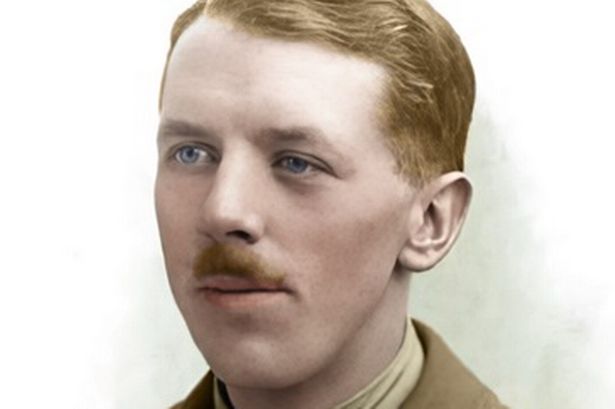An historian with a passion for local knowledge has shed further light on the life of a once-forgotten WWI soldier.
For 105 years second lieutenant Wilfred John Massey Lynch, from West Derby, lay in a nameless grave in France after being shot down in one of the most devastating military attacks of the war. The 25-year-old was killed by German troops on April 4, 1918, during the latter stages of Operation Michael – the first of three phases of the German Spring Offensive, aimed at crushing the Allied Forces before the arrival of American reinforcements.
His final resting place, and the circumstances of his tragic early death, were tracked down by the Ministry of Justice's "war detectives", and a gravestone was finally unveiled in a memorial service on March 23.
READ MORE: Grave of soldier killed in dying hours of battle finally honoured
Now further details of the young soldier's life have come to light, after retired history teacher Janet Hollinshead, 70, decided to research the names of soldiers engraved on the war memorial at Our Lady of the Annunciation Bishop Eton in Childwall.
She said: "Between 2014 and 2018 I somehow got involved in finding out about the names on the war memorial. Wilfred Massey-Lynch is one of the names on this memorial, so I turned to ancestry and church documents to find out about him. This is how I found out he emigrated to Australia, and in fact returned to fight in the war."
She said Wilfred was indeed recorded as being from West Derby, but earlier documentation showed he was actually born in Blundellsands in 1893 to parents Thomas and Eliza Massey-Lynch. The 1901 census showed the family, which included two older brothers, living in Seaforth.
By 1911 they had moved to Waterloo, where Wilfred attended Stonyhurst College, a Catholic boarding school in Clitheroe, before starting work as a junior bank clerk in Liverpool.
His life then took an unexpected turn, as he gave up his promising white-collar job to become a trainee farmer at Great Howle near Ross-on-Wye. Here, he met his future wife, Gwendoline Harris. The couple married in July 1914 and emigrated to Australia to establish a fruit farm, just one month after the outbreak of WWI.
After two years of relative stalemate, Britain's troops began gathering new steam in 1916 as the focus of the war shifted back to the Western Front in France. In January 1916, Britain introduced the Military Service Act, replacing voluntary service with conscription, and Wilfred returned to England to sign up on October 10, 1916.
He joined the sixth regiment of the Household Cavalry, and was soon attached to the third regiment of the Dragoon Guards. He was wounded and suffered shell-shock in January 1918, but re-joined his regiment only a month later.
At 7am on April 4, 1918, Wilfred's battalion was sent to operate on the right flank of 43rd Brigade north of the Villers-Bretonneux to Warfusee Road, France. At 9:15am they carried out reconnaissance and filled in any gaps they found in the line. A new line was dug and they remained around this location throughout the day as the enemy attacked. It was during this fighting that Wilfred was killed.
For years his grave remained unmarked, and he was remembered by the Stonyhurst War Record, at St Joseph’s Church in Blundellsands, at SS. Peter and Paul Catholic Church in Crosby, at All Saints Church, Bishopswood in Herefordshire, at Ross-on-Wye Church, as well as at Bishop Eton.
Janet said: "It's a very small, unprepossessing war memorial, but it turns out there's a collection of the most amazing names. The fact they've not been able to rediscover the grave of one of them just adds to the amazing collection they have got."
Other notable names included two Redemptorist chaplains, Fr Bernard Kavanagh and Fr Charles Watson, who enlisted as army chaplains despite both being in their fifties, and died in Jerusalem and Iraq respectively. Captain John Aidan Liddell, who attended Stonyhurst College at the same time as Wilfred, and was awarded the Victoria Cross after flying over Belgium under heavy fire, successfully pulling his aircraft out of a 3,000ft nosedive and saving the life of his crewmate. Tragically, he was badly wounded in the battle, and died of his injuries on August 31 1915.
Janet said: "It's a really poignant and interesting group of names. Like Wilfred went to Australia, there was another soldier who emigrated to Canada and also came back. I had no reason to suspect this when I began my research, but it turned out to be quite the unusual collection."
READ NEXT
Criminals serving city's longest sentences as Thomas Cashman jailed for 42 years
Olivia Pratt-Korbel's infectious laugh heard in newly released videos
Passenger dies on Jet2 flight after going to the toilet 'in distress'
Thomas Cashman's expensive lifestyle funded by the pain and misery he caused
'Larger than life hero' dad killed on M62

